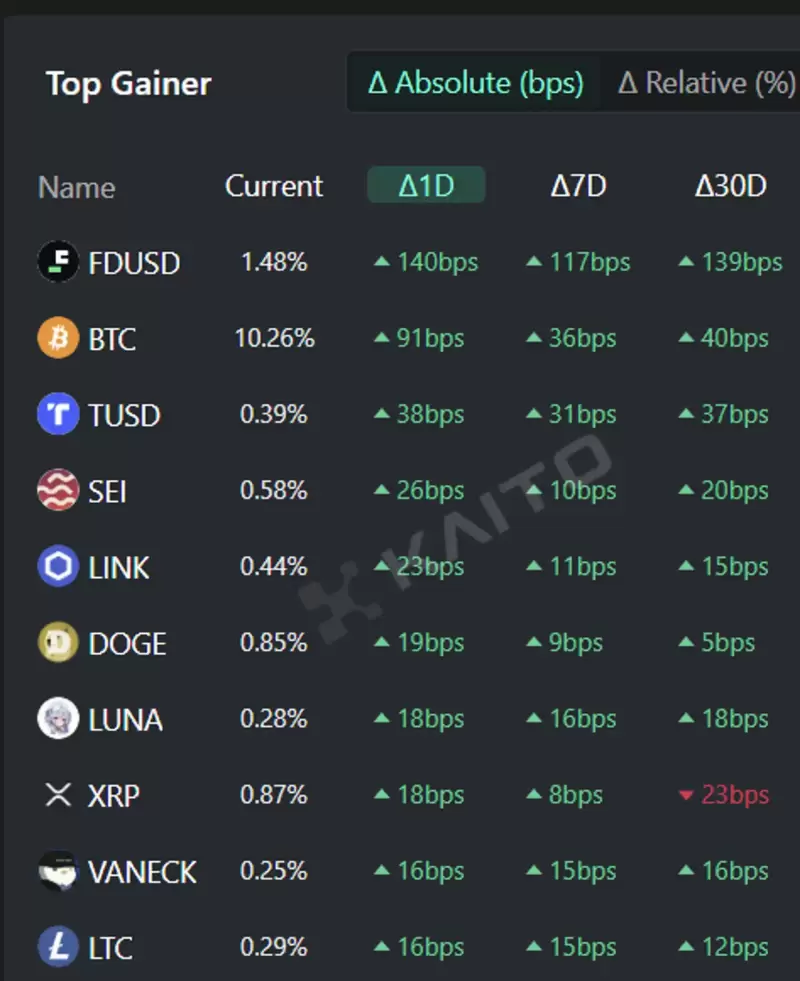 |
|
 |
|
 |
|
 |
|
 |
|
 |
|
 |
|
 |
|
 |
|
 |
|
 |
|
 |
|
 |
|
 |
|
 |
|
正统的风险投资永远不会为去中心化人工智能提供资源来挑战微软、Alphabet、苹果等公司。去中心化人工智能协会主席 Michael J. Casey 表示,唯一的方法是用用户拥有的、基于代币的系统取代股权融资。

The six most heavily capitalized companies in the U.S. are engaged in a spending war as each tries to outrace the others toward artificial intelligence (AI) supremacy.
美国资本最雄厚的六家公司正卷入一场支出战,每一家公司都试图超越其他公司,争夺人工智能 (AI) 的霸主地位。
Together, Microsoft, Alphabet, Apple, Meta, Amazon and Nvidia are booking $1.8 trillion in annual revenues, a number that would put their combined inflows in 10th place of global country rankings if we viewed them as a proxy for national gross domestic product (GDP) – just behind the gross output of Brazil's 220 million people.
微软、Alphabet、苹果、Meta、亚马逊和英伟达的年收入合计为 1.8 万亿美元,如果我们将它们视为国家国内生产总值 (GDP) 的代表,那么这些企业的总流入量将在全球国家排名中位列第 10 位。 )——仅落后于巴西2.2亿人口的总产值。
Meanwhile, The Six have a combined market capitalization of $15 trillion, capturing an astounding one third of the entire S&P 500 index.
与此同时,六大公司的总市值达到 15 万亿美元,占据了整个标准普尔 500 指数的惊人三分之一。
Despite – or perhaps because of – this unprecedented scorecard, these companies are relentlessly competing for world domination. Doing what great American companies have always done, they’re unleashing a competitive instinct that, in a normal capitalist economy of diversified goods and services, is the core driver of technological progress.
尽管——或者或许正是因为——这种史无前例的记分卡,这些公司仍在不懈地争夺世界统治地位。他们正在做伟大的美国公司一直以来所做的事情,释放竞争本能,在商品和服务多样化的正常资本主义经济中,竞争本能是技术进步的核心驱动力。
So, don’t worry about The Six. Worry about us.
所以,不用担心六人组。担心我们。
Because our problem amid the dizzying advance of AI is definitely not one of a shortfall in technological progress. It’s that this particular form of technological progress comes with risks to human autonomy and safety. And to mitigate them, the question of who controls AI’s development and whether their incentives are aligned with the broadest base of humanity is fundamental.
因为在人工智能的飞速发展中,我们的问题绝对不是技术进步的不足。这种特殊形式的技术进步会给人类的自主性和安全带来风险。为了缓解这些问题,谁控制人工智能的发展以及他们的激励措施是否符合最广泛的人类基础的问题至关重要。
Just as was the case for Alphabet’s Google, Meta’s Facebook and Amazon’s marketplace, the development of these six companies’ large language models (LLMs) and other AI machinery is occurring within closed, black-box systems.
正如 Alphabet 的谷歌、Meta 的 Facebook 和亚马逊的市场的情况一样,这六家公司的大型语言模型 (LLM) 和其他人工智能机制的开发都是在封闭的黑匣子系统内进行的。
They’ve ingested the troves of data we all unwittingly poured into internet sites, and have built highly complex codebases into which no one has visibility. Between them, they dominate all layers of the AI stack: the storage (Amazon Web Services), the chips for computation (Nvidia), the AI models (Microsoft, with its investment in Open AI), the data (Alphabet and Meta) and the devices we use to interact with AI services (Apple).
他们吸收了我们无意中倒入互联网网站的大量数据,并构建了无人能见的高度复杂的代码库。它们主导着人工智能堆栈的所有层:存储(亚马逊网络服务)、计算芯片(Nvidia)、人工智能模型(微软,投资开放人工智能)、数据(Alphabet 和 Meta)和我们用来与人工智能服务交互的设备(Apple)。
They might be competing with each other, but they form a vertically diversified oligopoly. Or rather, given the undeniable power that their technology can wield over people’s lives, they’re an oligarchy. Indeed, the secrecy around the means by which they exercise that power is characteristic of most oligarchical dictatorships.
它们可能相互竞争,但它们形成了垂直多元化的寡头垄断。或者更确切地说,鉴于他们的技术可以对人们的生活发挥不可否认的力量,他们是寡头政治。事实上,对他们行使权力的方式进行保密是大多数寡头独裁政权的特征。
Toward the latter phase of the Web2 era, people eventually came to understand Bruce Schneier’s memorable observation that we are not the internet platforms’ customers; we are their products. With that awareness, we’re now also finally opening our eyes to how these companies have long been incentivized to modify people’s behavior in unhealthy ways to maximize shareholder returns.
在 Web2 时代的后期,人们最终开始理解 Bruce Schneier 的令人难忘的观察:我们不是互联网平台的客户;我们是互联网平台的客户。我们是他们的产品。有了这种认识,我们现在终于开始关注这些公司长期以来如何被激励以不健康的方式改变人们的行为,以实现股东回报最大化。
It is no longer controversial to talk of the psychological harm done by the algorithms of Facebook, YouTube, Tik Tok and their ilk, which were blatantly designed to exploit dopamine releases to encourage continued, addictive engagement.
谈论 Facebook、YouTube、Tik Tok 等算法造成的心理伤害已不再是有争议的事情,这些算法公然旨在利用多巴胺释放来鼓励持续的、令人上瘾的参与。
When Frank McCourt and I published Our Biggest Fight in March 2024, we were overwhelmed by parents’ horror stories of the harm social media had done to their kids. And then a Harris Poll coordinated by NYU Professor Johathan Haidt found that young people are just as concerned: nearly half of Gen Z wishes that TikTok and X (Twitter) never existed, even as 83% of the same cohort said they spend four hours a day or more on social media.
当弗兰克·麦考特和我于 2024 年 3 月出版《我们最大的斗争》时,我们对父母讲述社交媒体对孩子造成的伤害的恐怖故事感到不知所措。然后,由纽约大学教授 Johathan Haidt 协调的哈里斯民意调查发现,年轻人也有同样的担忧:近一半的 Z 世代希望 TikTok 和 X (Twitter) 从未存在过,尽管同一群体中 83% 的人表示他们每天花四个小时在社交媒体上停留一天或更长时间。
So, if we now know of the harms, why on earth would we extend the same oligopolistic control structure into the AI era? AI will put the Web2 oligopoly on steroids.
那么,如果我们现在知道了这些危害,我们到底为什么要把同样的寡头垄断控制结构延伸到人工智能时代呢?人工智能将使 Web2 寡头垄断地位进一步增强。
This is why I believe the creation of distributed, collectively owned open-source AI is a vitally important use case for Web3 and blockchain technology. It’s the only way to avoid the problem of misaligned incentives.
这就是为什么我相信创建分布式、集体所有的开源人工智能是 Web3 和区块链技术的一个极其重要的用例。这是避免激励失调问题的唯一方法。
Sure, there are technical challenges, such as the latency that, for now, makes distributed machine learning inefficient, the capacity limits of on-chain data, or the privacy risks inherent to public blockchains. But innovators are already hard at work on outside-the-box solutions to these problems, motivated by the huge economic and reputational payoff promised by overcoming them. And when they do, the inherent information advantages enjoyed by open systems over closed systems will give decentralized AI a fighting chance. Achieve that, and “DeAI” will represent not only the right moral path but also the economic winner.
当然,存在技术挑战,例如目前导致分布式机器学习效率低下的延迟、链上数据的容量限制或公共区块链固有的隐私风险。但创新者已经在努力寻找解决这些问题的创新解决方案,克服这些问题所带来的巨大经济和声誉回报是他们的动力。当他们这样做时,开放系统相对于封闭系统所享有的固有信息优势将为去中心化人工智能提供战斗机会。实现这一点,“DeAI”将不仅代表正确的道德道路,而且代表经济赢家。
Here’s the rub: time is not on our side. And the fight is heavily lopsided. As cited above, The Six have an unprecedented $15 trillion war chest.
问题是:时间不在我们这边。而且战斗已经严重一边倒。如上所述,六人组拥有前所未有的 15 万亿美元战争资金。
In the 2000s, Facebook and Google learned that their high-value share prices gave them a currency with which to relentlessly acquire startups that could either enhance or threaten their dominance. Now, The Six have even greater capacity to buy up and integrate whatever breakthroughs in AI are coming, be it in independent AI agents or more efficient systems of compute
2000 年代,Facebook 和谷歌了解到,它们的高价值股价为它们提供了一种货币,可以用来不断收购可能增强或威胁它们主导地位的初创公司。现在,六人组拥有更大的能力来购买和整合即将到来的人工智能突破,无论是独立的人工智能代理还是更高效的计算系统
免责声明:info@kdj.com
所提供的信息并非交易建议。根据本文提供的信息进行的任何投资,kdj.com不承担任何责任。加密货币具有高波动性,强烈建议您深入研究后,谨慎投资!
如您认为本网站上使用的内容侵犯了您的版权,请立即联系我们(info@kdj.com),我们将及时删除。
-

- 南非的税收服务敦促加密资产市场参与者注册
- 2025-04-03 16:05:12
- 南非的税务局敦促参与加密资产交易的人在当局登记,因为它试图控制税收违约者。
-

- 哈萨克斯坦,阿联酋与CBDC开发合作
- 2025-04-03 16:05:12
- 哈萨克斯坦金融部门的代表团最近访问了阿拉伯联合酋长国(UAE),以加强数字资产和区块链技术方面的协作。
-

-

-

-

-

-

- 失去关键支持水平后,Pepe(Mind)价格下跌超过15%
- 2025-04-03 15:50:12
- PEPE价格在每周的时间范围内下跌超过16%,此前24小时下跌5%,价格为$ 0.000007173
-





























































